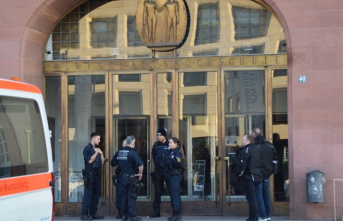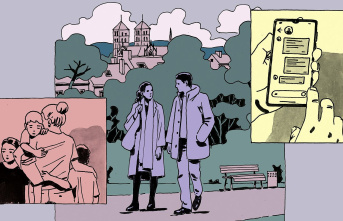The wait is exploding in surgery in Quebec, but the delays are getting longer unevenly depending on the hospital, so that unlucky patients hang around for years longer for the same operation simply because of their postal code.
• Read also: Delays for knee surgery: wait until you lose your dignity
• Read also: COVID-19: impacts of the pandemic on medical interventions
Barely 12 km separate the Santa Cabrini Hospital and the Jewish General Hospital in Montreal. However, a patient who needs knee surgery will wait an average of 76 weeks for the first, compared to 15 for the second. A difference... of more than a year.
In Montérégie, the delay for cataract surgery is four times longer in Châteauguay (40 weeks) than in Saint-Jean-sur-Richelieu (nine weeks).
In Saguenay, bariatric surgery takes up to five times longer in Chicoutimi (75 weeks) than in Roberval (14 weeks).
These are the average delays from April 2021 to February 2022. The April 2022 data recently published by the Ministère de la Santé et des Services sociaux (MSSS) show even longer delays.
A RECORD OF PATIENTS
With nearly 160,000 people waiting for elective surgery in Quebec, the waiting time is important information for patients.
Because the law provides that a patient can be operated on wherever he wishes. But in reality, it is almost impossible to have a say.
“He can no longer choose,” recognizes general practitioner Joanie Tremblay-Pouliot, of Quebec Doctors for the Public Regime. Previously, the patient himself would bring his request to the hospitals.
But, since the arrival of the Service Request Dispatch Center (CRDS) in 2016, the family doctor sends the request to a computerized system in the region. Hospitals and specialists then have access to it.
"Why are there so many disparities, even within Montreal?" wonders Dr. Tremblay-Pouliot, who does not understand why the patients are not better distributed.
The Journal presents here the average times for five surgeries (knee, hip, bariatric, day surgery, cataract).
Compiled by the Ministry of Health and Social Services (MSSS), the wait is calculated from the moment the patient meets the surgeon who will operate on him.
EVEN LONGER
However, this average MSSS delay is only part of the total wait. It is also necessary to count the wait between the request to the CRDS and the first appointment with the surgeon. Some patients wait years for this call. The MSSS does not compile these two deadlines.
“The patient should not suffer from his postcode. But trying to change that will be a major challenge, ”reacts Dr. Serge Legault, vice-president of the Federation of Medical Specialists of Quebec (FMSQ).
Moreover, specialists rush to see patients registered with the CRDS, which swells their waiting list, in order to put pressure on obtaining operating time.
“People try everything for their clientele. It plays hard between specialties,” admits Dr. Jean-François Joncas, president of the Association des orthopédistes du Québec.
COMPLEX CHALLENGE
The FMSQ adds that a ministerial committee is currently considering a regional waiting list based on surgical priority. A complex challenge, where the management of postoperative complications must be planned.
Dr. Serge Legault also insists on the importance of the bond of trust between the patient and his surgeon, who could suffer in such a system.
“Patients are willing to wait three months to have surgery closer, and others are willing to travel 500 km to get through faster. We should respect the preferences of the patient,” said Maude Laberge, health researcher at the CHU de Québec.
– With the collaboration of Charles Mathieu
The system for booking appointments to see a specialist is mired in bureaucracy that prevents family doctors from sending patients where the wait is shorter, they lament.
"We have no power over it," laments Dr. Sylvain Dion, vice-president of the Federation of General Practitioners of Quebec (FMOQ).
Since 2016, Quebec has set up the Service Request Dispatch Center (CRDS). When a patient needs to see a specialist, their family doctor sends a request to the system, which then finds an appointment.
Although the law on health and social services provides that a patient can choose the place where he wants to be treated, family doctors come up against a bureaucracy that prevents them from sending people to another region.
A patient can tell his family doctor where he wants to be treated, but it is far from guaranteed, admits the FMOQ.
“Sending someone from the South Shore to the island of Montreal is complicated,” summarizes Dr. Dion.
YOU DON'T DECIDE...
“It is the CRDS that decides! laments Dr. Dion. When I know that I will always come up against an end of non-receipt from the CRDS [...] I do not want to make repeated requests. We come up against this bureaucracy,” he said.
At the Ministry of Health and Social Services, it is specified that transfers are possible in exceptional cases, and that they are therefore not offered to meet access issues.
Indeed, several doctors interviewed by Le Journal have in mind stories of regional bickering, where patients have been sent back to the region where they live.
However, the Association des orthopédistes du Québec points out that agreements to transfer patients to more efficient regions existed before the CRDS.
IMPOSED SYSTEM
“It was imposed on us, says President Dr. Jean-François Joncas, about the CRDS. We could have skipped it."
The FMOQ ensures that it does not oppose regional transfers.
“The CRDS is a very, very flawed system. But the basic intentions were good, to bring the patient closer to his treatment,” says vice-president, Dr. Serge Legault.
Furthermore, the FMOQ believes that the CRDS is a good tool that provides an overall idea of the wait. However, we regret that the deadlines are not respected and that follow-up is difficult.
According to the Health and Social Services Act:
“Everyone has the right to choose the professional or the establishment from which they wish to receive health services or social services. Nothing in this law limits the freedom of a professional to agree or not to treat a person.
However, criteria limit this right:
Quebec aims to operate on 90% of patients within 6 months for certain surgeries (cataract, bariatric, knee, hip).
After 6 months, the hospital must offer the patient a second option: change surgeon or hospital, go to another region or to a specialized medical center (CMS).
Patients have the choice to accept or decline the offer. However, “in the current context where all establishments have significant waiting lists, it is not possible to offer a second offer to users”, writes the Ministry of Health and Social Services (MSSS).
Contracts between private clinics and hospitals to operate on private patients are unfair, doctors complain, since those who signed agreements first are better served.
“It is certain that the offer is in a logic of free for all, admits Dr Hugo Viens, co-owner of the DIX30 clinic. The contractual agreements with the CISSSs lead to inequality, that’s clear.”
Since the pandemic, several hospitals have signed agreements with private surgery clinics, called Specialized Medical Centers (CMS), to operate on patients there. Note that the patient does not pay a penny for his surgery, and is operated by his doctor.
LUCK FOR THE FASTEST
“At the start of the crisis, it was necessary to act quickly, and the contracts with the specialized clinics, it was first come, first served”, notes Dr. Salin Lahoud, president of the Association of ophthalmologists of Quebec.
“Some hospitals had contracts and access to operating rooms, but the region next door did not have access to these contracts quickly enough because the administrators were not keen enough to find a solution quickly. he says.
Considering the delay in surgeries in Quebec, the CMS are an important resource for reducing delays. However, each Integrated Health and Social Services Center (CISSS) negotiates its own contracts, confirms the Ministry of Health and Social Services (MSSS).
Result: a patient who lives in a region well provided for in contracts with CMS risks being operated on well before another citizen who has to wait in the hospital.
"At the moment, what makes the biggest difference [in the delay] is the CMS in the region or not", observes Dr. Michel Dunberry, director of the operating room at the Joliette hospital, who has no agreement.
SIGNIFICANT GAP
Last summer, the Laval hospital was operating at 111% of its capacity, thanks to CMS. At the same time, Lanaudière was only running at 67%.
In Brossard, the Dix30 surgery clinic has contracts with the three CISSSs of Montérégie. However, even if the hospitals of Châteauguay and Salaberry-de-Valleyfield have the worst delays, their access to the CMS is recent and limited.
According to the MSSS, work is currently underway to standardize surgery contracts with the CMS.
1












